SEDATION DENTIST FOR KIDS KATY
Calm Children’s Dental Care on Demand
Bringing your child to the dentist can be stressful, but it doesn’t have to be! Dr. Mehta and our team know how to soothe children who might be nervous and show them that dentistry is nothing to be afraid of, but for those with more persistent anxiety, sedation can be a lifesaver. These safe and proven methods can stop racing minds and allow everyone to breathe easy while your child gets the care they need. Think your child could benefit from sedation dentistry here in Katy? Let’s talk about it! Give us a call today so we can make sure they have the smoothest dental visit possible.
Why Choose Wellspring Pediatric Dentistry for Children’s Sedation Dentistry?
- Led by Award-Winning Board-Certified Pediatric Dentist
- Several Dental Sedation Options to Suit Each Child
- Warm, Friendly, & Kind Dental Team
Nitrous Oxide (Laughing Gas)

As the lightest form of sedation dentistry that we offer, nitrous oxide is perfect for children with low-level dental anxiety who just need a little help to get through their routine checkups or basic dental treatment. A small mask is placed over their nose, and after a few breaths of the nitrous oxide/oxygen mixture, they will feel warm, floaty, and maybe get the giggles. This will last throughout their appointment, and they’ll feel like themselves again within minutes of removing the mask, meaning they can resume their normal routine afterward.
Who Is a Good Candidate for Nitrous Oxide?
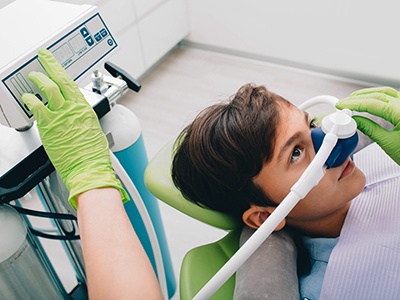
Children who struggle with any of the following are likely to benefit from nitrous oxide:
- Mild dental anxiety
- Sensitive or strong gag reflex
- Have difficulty sitting still
- Have physical disabilities that make it hard to remain in a treatment chair for long
- Have trouble responding to other forms of sedation
- Have a fear of needles
If your child suffers from sinus congestion or has a respiratory illness of any kind, make sure to let a member of our dental team know, as this can hinder the effectiveness of sedation.
How Does Nitrous Oxide Work?
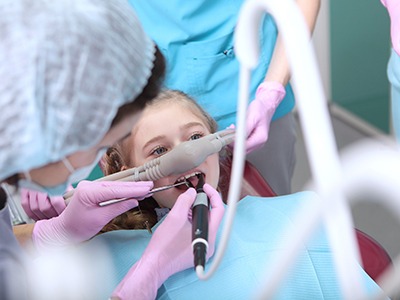
Administering nitrous oxide is a simple and easy process. Once your child arrives at our office and is comfortable in the treatment chair, we will place a small mask over their nose and instruct them to inhale. The gas mixture will be turned on so that they begin to feel the effects of the nitrous oxide within minutes.
They will soon become fully relaxed and may even doze off; however, they will not be unconscious, as nitrous oxide does not lead to unconsciousness. Instead, they can be easily awakened by our staff should they need to respond to one or more cues throughout treatment.
Aftercare for Nitrous Oxide

Once we are finished with your child’s treatment, we will remove the nasal mask and turn off the gas. Within minutes of breathing pure oxygen, they will feel like their regular self and be able to resume normal activity after leaving our office.
This is one of the added benefits of nitrous oxide. Its post-operative side effects do not linger, so your child can return to school or home immediately following their appointment. However, if the treatment they receive requires that they follow certain instructions for a successful recovery, you’ll need to make sure they adhere to these guidelines.
Oral Conscious Sedation
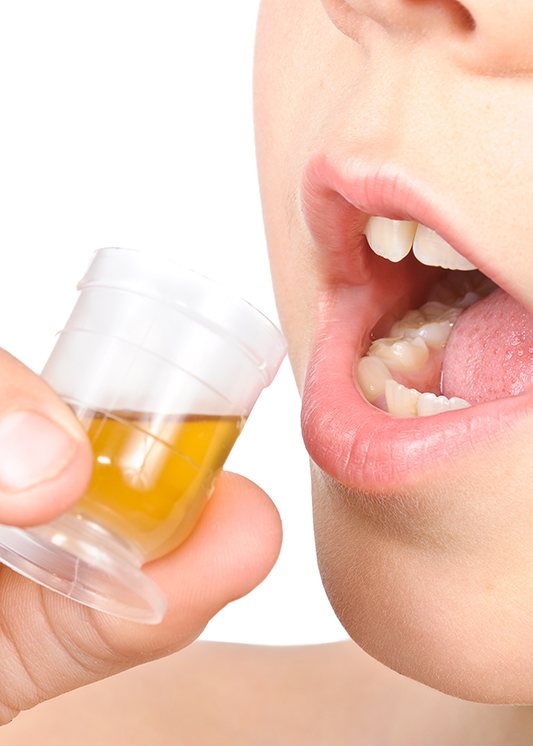
With oral conscious sedation dentistry, your child will take a pill or drink a small cup of medication on the day of their visit, and this will put them into a relaxed state that will allow our team to work efficiently while they stay relaxed. Time will fly by for them, and the visit will be over before they know it. Because OCS is stronger than nitrous oxide, the effects take longer to wear off, so you should plan for them to stay home following their visit.
What Is Oral Conscious Sedation?

Oral sedation is a popular method for helping kids in Katy relax because it does not require the use of needles or a face mask, both of which might be intimidating for young patients at times. All your little one has to do is swallow a prescribed dose of sedative medication shortly before their treatment, which might be in liquid or pill form. Within a few minutes, your child should start to feel very calm and relaxed. They might also drift off to sleep, though it should be easy for us to awaken them with gentle stimuli.
How Does Oral Conscious Sedation Work?
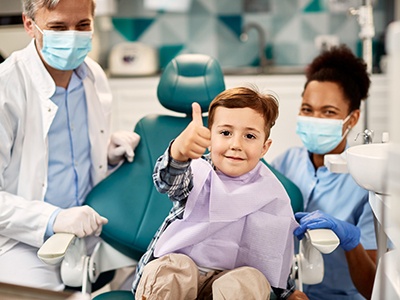
OCS is relatively powerful, so we expect that your child will remain very relaxed and comfortable throughout their appointment. Once they go home, they might be tired and groggy for several hours, so make sure they have plenty of opportunity to rest.
After the sedation wears off, your child might not have any memory of their appointment. Many parents like this aspect of sedation because it can prevent kids from forming a negative opinion about dental care.
Who Is a Good Candidate for Oral Conscious Sedation?

Oral conscious sedation might be suitable for your child if:
- They suffer from a degree of dental anxiety, fear, or even phobia.
- They have a condition that makes it difficult for them to remain still and calm during dental treatments.
- They have an overly sensitive gag reflex.
- They do not have any contraindications for oral conscious sedation. We will ask about their medical history so we can be aware of any risk factors that might affect their candidacy for OCS.
IV Sedation

If a child with special needs or behavioral problems needs a relatively complex procedure, we may recommend treating them under IV sedation or general anesthesia. They will be paired with a licensed anesthesiologist who will put them to sleep during their procedure, and they will wake up with no memory of it happening. Our multidisciplinary approach allows us to monitor your child’s vital signs throughout the appointment to ensure they are safe, giving us all the control we need to deliver effective care.
What Is IV Sedation?
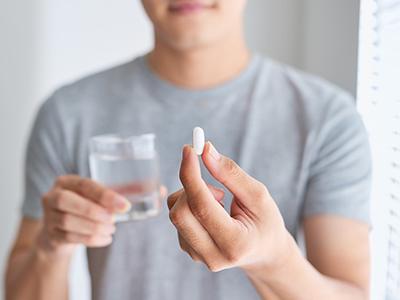
IV sedation is delivered intravenously, or directly into the patient’s bloodstream. Its effects kick in very quickly and are quite powerful.
IV sedation is sometimes called “twilight sedation” or sleep dentistry because, even though it does not cause total unconsciousness, Katy patients might feel as if they are asleep due to their deep state of relaxation. (General anesthesia is different and does cause total unconsciousness.) We can adjust the level of sedation throughout your child’s appointment to make sure they stay comfortable.
It can take up to a full day for IV sedation to completely wear off, so you should make arrangements for your child to have plenty of time to rest after their procedure.
Who Is a Good Candidate for IV Sedation?

We might recommend IV sedation or general anesthesia for your child if:
- They have special needs, such as a physical condition that makes it difficult for them to sit still or a behavioral disorder.
- They need to undergo a particularly complex or lengthy procedure.
- They have a sensitive mouth or strong gag reflex and are not easily numbed by local anesthesia.
- They do not have any risk factors that might make this form of sedation unsafe for them. For example, they should not have certain allergies or respiratory conditions.
The Benefits of IV Sedation
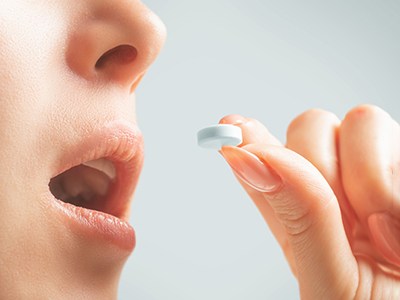
IV sedation and general anesthesia can offer some outstanding benefits for young patients:
- With the help of sedation, your child might be able to undergo necessary treatments that would otherwise be difficult for them to tolerate.
- IV sedation is quite powerful, and its effects kick in very quickly.
- The ability to control the level of sedation during treatments means that your child will remain comfortable even during lengthy procedures.
- It can prevent your child from forming negative memories of dental care.
- Sedation is a low-risk way to make patients more comfortable.
- Sedation can allow our team to work as efficiently as possible.
Sedation Dentistry FAQs
Is sedation dentistry safe?
Sedation dentistry is perfectly safe for most patients as long as it is administered by a qualified professional. Before recommending a sedation treatment, Dr. Mehta will carefully review your child’s medical history to determine the best way to ensure their safety and comfort. Most patients can receive nitrous oxide sedation without any problems since it doesn’t cause any long-term side effects and is eliminated from the body within minutes after treatment. While your child is sedated, our team will carefully monitor their vital signs to ensure their safety.
Will my child remember anything with dental sedation?
While your child may be awake during dental sedation treatment, they may not remember much of their appointment depending on how the sedative was administered. Patients are more likely to remember their appointments if they receive nitrous oxide or oral conscious sedation than if they receive IV sedation. If your child receives general anesthesia, they should not remember anything since they will be completely unconscious. The minor memory lapse caused by dental sedation can actually have a beneficial effect since it can prevent patients from retaining unpleasant memories that can make it more difficult for them to receive dental care later.
What are the risks of sedation dentistry?
While sedation dentistry is risky for a few patients, it is incredibly safe for most people. Nasal congestion can make nitrous oxide less effective, and sleep apnea and certain medications can also lead to complications with sedation dentistry. Since everyone reacts differently to every medication, Dr. Mehta will carefully review your child’s medical history before recommending dental sedation. Nitrous oxide typically results in no lingering side effects, but other sedation options may cause nausea, headache, or grogginess that can last for several hours.
How long does dental sedation last?
The duration of the effects of dental sedation treatment depends on the method used. For example, the effects of nitrous oxide should fade away within several minutes of when your child stops receiving the gas, and they should feel no lasting drowsiness. The effects of oral conscious sedation may last for the rest of the day, and while the effects of IV sedation and general anesthesia should wear off shortly after the procedure, your child will probably feel groggy for a few hours afterward.
Does dental sedation make you tell secrets?
While the old trope that laughing gas makes you blab about all your embarrassing secrets can be very funny in cartoons or in movies, this is extremely unlikely in real life. Even if we do hear something unusual from a sedated patient, we will not record or mention it afterward in any case.

